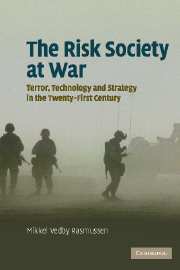Book contents
1 - Introduction
Published online by Cambridge University Press: 22 September 2009
Summary
At the beginning of the twenty-first century, people fortunate enough to live in Western societies are probably more secure than at any point in the twentieth century. No system of alliances currently creates a mechanism of international obligations that might trigger a war in the way that European alliances triggered the First World War. An almost universal consensus on the values of liberal democracy and the free market means that no totalitarian ideology is threatening to bury the Western way of life in the way that fascism did in the Second World War and communism during the Cold War. Not only are there fewer political reasons for conflict at the beginning of the twenty-first century, but the military means, such as nuclear weapons, for fighting these conflicts are no longer on the hair-trigger alert that was maintained during the Cold War. Today it is hard for schoolchildren to imagine that their grandparents were taught to ‘duck and cover’ or that their parents worried about whether Russians loved their children enough not to want to unleash nuclear Armageddon. Thus, measured by the standards of the twentieth century, we are safer than we have ever been. However, the standards by which we measure our security have changed.
To understand the way today's measurement of danger differs from the twentieth century it is useful to distinguish between threats and risks.
- Type
- Chapter
- Information
- The Risk Society at WarTerror, Technology and Strategy in the Twenty-First Century, pp. 1 - 11Publisher: Cambridge University PressPrint publication year: 2006



